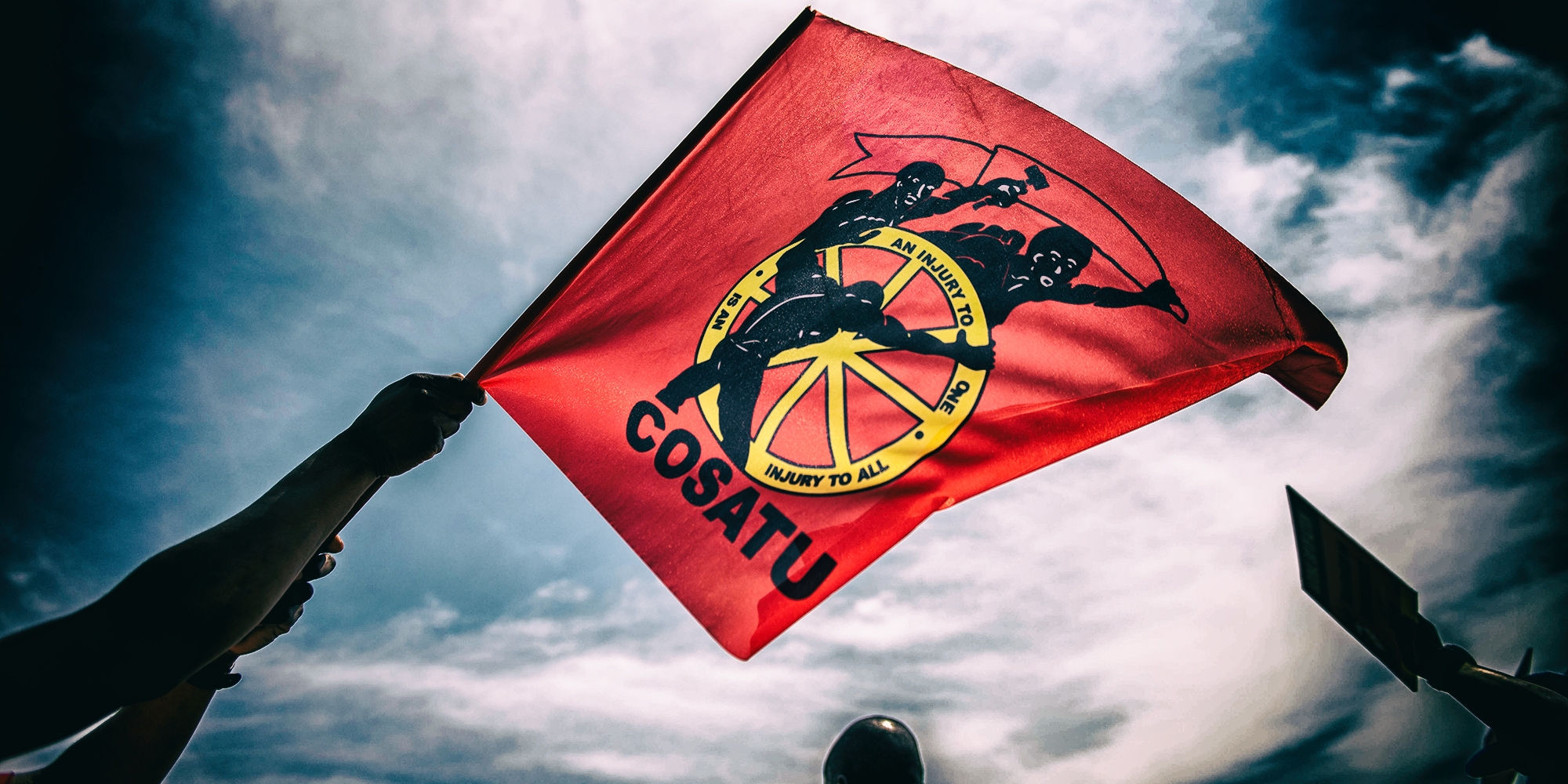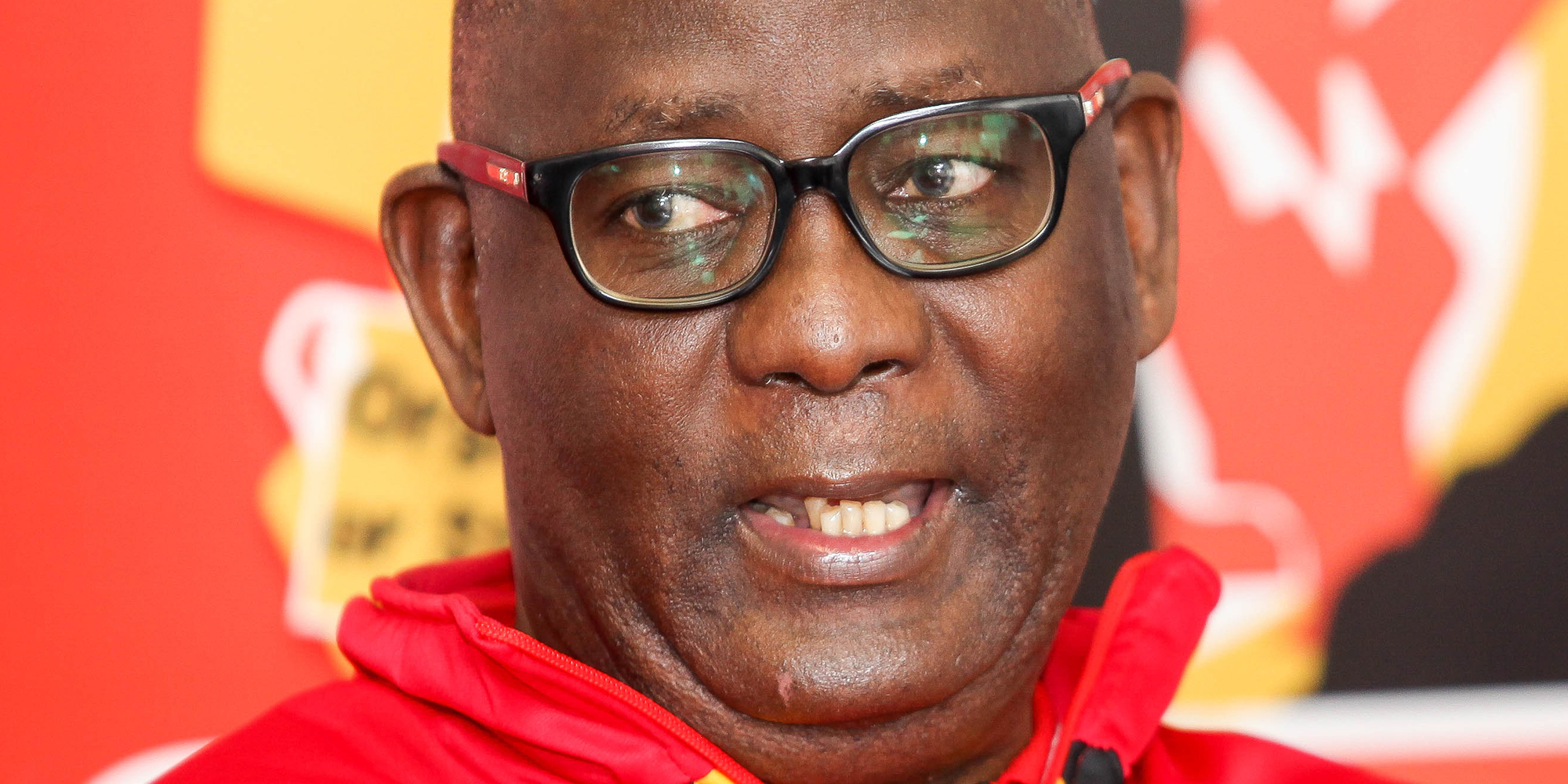Is Wednesday’s ‘national shutdown’ different from Wednesday’s ‘national day of action’ or Wednesday’s ‘nationwide strike’?
Nope. You may have seen a number of different labels attached to the mass action planned for Wednesday, 24 August, but they all refer to the same thing: a day of workers’ strikes and protest marches across South Africa.
So what exactly is going to happen on Wednesday?
The two largest South African trade union federations, Cosatu and Saftu, are calling on all non-essential workers to stay away from work on Wednesday. And they do mean all non-essential workers: Saftu General Secretary Zwelinzima Vavi stressed in a media briefing on Monday that the call to join was going out to “ordinary workers, professional workers, black and white, middle class”.
 The two largest South African trade union federations, Cosatu and Saftu, are calling on all non-essential workers to stay away from work on Wednesday, 24 August. (Photo: Gallo Images / Alet Pretorius)
The two largest South African trade union federations, Cosatu and Saftu, are calling on all non-essential workers to stay away from work on Wednesday, 24 August. (Photo: Gallo Images / Alet Pretorius)
Protest marches are also planned for all provinces. The two largest demonstrations are likely to take place in Pretoria and Cape Town.
Read in Daily Maverick: "South Africa’s ‘oxymoronic’ national stayaway has very little going for it"
In Pretoria, diehard union members will be sleeping in the grounds of (or possibly outside) the Union Buildings on Tuesday night, Vavi has announced. Others will be gathering at Burgers Park from 6am on Wednesday morning to begin marching to the Union Buildings at 10am.
https://www.dailymaverick.co.za/article/2022-08-23-embattled-anc-staff-to-join-nationwide-strike-in-solidarity-with-cosatu/
In Cape Town, people will assemble at the city’s traditional march starting point, Keizersgracht, at 8am on Wednesday. Marches will start at 10am, heading for the Western Cape Legislature with a number of other possible stops including the provincial offices of the Department of Mineral Resources and Energy.
If I don’t pitch up for work on Wednesday, won’t I be in trouble with my boss?
The strike is legally protected, which means that technically your employer should not be able to fire or penalise you for participating — although you will be on firmer ground if you are a paid-up union member.
But as previously mentioned, you cannot strike — according to the Labour Relations Act — if you are an essential worker. This includes all workers whose jobs are deemed critical to the “life, personal safety, or health of the whole or any part of the population” — such as healthcare workers and cops.
Eskom CEO André de Ruyter has previously warned Eskom employees that they are considered essential workers, which means that they can face disciplinary action for participating in strikes.
What is the purpose of the day’s mass action?
In a nutshell: to shut down the economy so that the government has no choice but to pay attention to workers’ grievances.
The major grievance is the cost of living crisis, which has seen spikes in the cost of consumer transport, petrol, food and more. The rise in interest rates from the South African Reserve Bank has made servicing debts on cars and homes increasingly unaffordable: Vavi says that South Africans defaulted on R55-billion worth of debt between January and March alone.
While life gets more expensive, workers’ wages aren’t rising: in many cases, they have been frozen or increased below inflation rates. Add to this the spiralling local unemployment rates — the latest figures are due from Stats SA on Tuesday — and, to quote Vavi, “we can’t live like this”.
Then there are more specific concerns from the unions. They are opposed to attempts to privatise state-owned enterprises, which they say will make basic services even more expensive. They want transport subsidies for taxis — which Vavi says now ferry 80% of SA workers thanks to the collapse of the rail network — yet do not receive subsidies, unlike “the elite Gautrain”.
With an eye on the Medium-Term Budget due in October, the unions are also calling for an end to neoliberal economic strategies, austerity measures, and “policies that favour the elite and that are coloured by an animus towards the poor” (Cosatu’s words).
Visit Daily Maverick's home page for more news, analysis and investigations
Phew. That’s a lot. But what will one day’s mass action do about any of that?
“It will achieve absolutely nothing.”
Those were the words of Vavi at Monday’s press conference, speaking with refreshing candour. In isolation, he was saying, the action is clearly insufficient.
“It has to be seen as the beginning of a process of mobilising the working class,” Vavi said. After the day’s action, the unions will be meeting to “assess the government response”. There will be ongoing programmes “for as long as it is necessary for government to change practices”.
Is the best way to mitigate the effects of an economic crisis really to… shut down the economy?
Obviously, many are unconvinced. Economist Isaac Matshego told EWN that the shutdown risked causing further damage to the economy, which will have knock-on negative effects on workers.
For Vavi and Co, this dramatic step is necessary to send the message to the government that the status quo is totally unsustainable. Vavi suggests that the increasingly bad living conditions for ordinary South Africans are being felt in a “social crisis” manifesting in rising rates of crime and violence.
How many people are the unions expecting to participate in the marches in big cities nationally?
Vavi was not born yesterday, and would not be drawn into giving optimistic estimates of numbers to journalists.
“We are not going to see anything close to [similar shutdown action in] 2018,” he said, explaining that without a functioning train network, protester numbers in city centres would inevitably be limited. While Saftu and Cosatu are providing some transport, this will not be an adequate substitute in terms of bringing workers into cities to march.
Read in Daily Maverick: "Jobs, crime and cost of food, transport and electricity top marchers’ litany of woe"
Vavi also said that the unions were emphasising to workers that the most important action they could take on Wednesday was to stay at home and strike. Participation in the protests should be seen as an optional extra.
If Cosatu and Saftu are working together on this, does that mean they don’t have a beef any more?
No. Wednesday’s action could best be described as a very tentative and temporary alliance between the two warring federations. Cosatu’s posters don’t mention Saftu’s involvement, and vice versa.
The precariousness of the alliance is evident from the fact that the two bodies weren’t even able to organise a joint press conference together to announce the mass action.
On Monday, Vavi painted this as primarily Cosatu’s fault, saying: “We have tried to meet with Cosatu very hard, by the way”, and blaming both a “misunderstanding” (unspecified) and a “spirit of competition”.
What the two federations have been able to agree on: the basic programme of action, in terms of the marches in most provinces, and the list of speakers at the main events.
“On the ground, there will be common action. There will be joint action, there will be unity in action,” Vavi said.
There is a sense that Wednesday’s action will be an important political litmus test for the ability of what Vavi termed “a broad front of working-class formations” to work together.
Vavi hinted at the possible development of a “mass workers’ party” to contest elections, though past iterations of this idea have been unsuccessful in South Africa.
The fractiousness that has enveloped union politics in recent years — from the Cosatu-Saftu feud to the current internal Numsa war, with countless other examples — has proved deeply unappealing to workers. Ultimately, it is this infighting within labour and the South African left that may prove the greatest challenge in terms of mobilising workers to demand change. DM




 The two largest South African trade union federations, Cosatu and Saftu, are calling on all non-essential workers to stay away from work on Wednesday, 24 August. (Photo: Gallo Images / Alet Pretorius)
The two largest South African trade union federations, Cosatu and Saftu, are calling on all non-essential workers to stay away from work on Wednesday, 24 August. (Photo: Gallo Images / Alet Pretorius) 